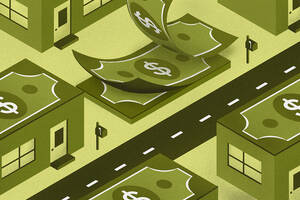Financial institutions teeter on the brink of ruin. Banks are devouring bailout money but have yet to loosen credit enough to ease a recession that is sweeping the globe. A question on many lips is, “How in the world did so many financial titans take such huge risks with our nation’s well being?&rdrdquo; A new study by Camelia Kuhnen (Finance) and Joan Chiao (Psychology, Northwestern University) takes provocative steps toward answering that extraordinarily complex question. Appearing in the journal PLoS ONE, the study is the first to link financial investment risk-taking to variations in certain genes that regulate chemicals in the brain.
“Our research pinpoints, for the first time, the roles that specific variants of the serotonin transporter gene and the dopamine receptor gene play in predicting whether people are more or less likely to take financial risks,” said Kuhnen. “It shows that individual variability in our genetic makeup effects economic behavior.”
Tapping into Advances in Neuroscience
Until this study, the identification of specific genes underlying financial-risk preferences remained elusive. But Kuhnen and Chiao were able to take advantage of advances in neuroscience methodology, as well as emerging research on the two neurotransmitters’ effects on decision-making. Prior research linking genetic variation to emotion and behavior suggested that those particular brain mechanisms could play a role in financial risk-taking. The serotonin transporter gene, 5-HTTLPR, as its name implies, influences how the neurotransmitter serotonin is moved around neurons in the brain. This gene occurs in two different versions, or “alleles,” with the “short&rdrdquo; version having been linked to negative emotion. The dopamine receptor gene, DRD4, influences how neurons respond to the chemical dopamine. This gene, which also occurs in multiple alleles, has been linked to addiction.
Northwestern University’s NewsCenter interviews Kellogg Professor Camelia M. Kuhnen.“Emerging research told us, for example, that people higher in neuroticism are thought to carry the short allele of the 5-HTTLPR, a less efficient version of the serotonin transporter gene,” said Chiao. “Similarly, individuals with the 7-repeat allele of DRD4, relative to those with other variants of that neurotransmitter, are more likely to have higher novelty seeking behavior.”
An Exercise in Risk
To explore how those genetic variants influenced financial risk-taking, Kuhnen and Chiao gave Northwestern students real money to make a series of investments. The study included 65 students, each of whom completed 96 trials in a computerized experiment. They received background information and were asked to make decisions between pairs of risky and risk-free investments. They were told that a risk-free asset had a guaranteed rate of return, which typically hovered around three percent. The risky investments came with two equally likely returns, for example, 20 percent and negative ten percent.
Students were initially given $15, and received additional funds for each of the 96 investment decisions. They allocated their funds between the two assets in each trial, but were not told the performance of their portfolios (how much money they were making or losing overall) until the end of the exercise. The entire experiment took roughly ninety minutes, and awarded an average of $25 to each student.
Risk-taking in the marketplace may be the result of the genetic makeup of traders and investors.As predicted by finance theory, students invested significantly more money in the risky asset when (1) its expected return was higher, (2) the variability of its return was lower, or (3) the return of the safe asset was lower. Also, the larger the amount of money available, the more money students invested in the risky asset.
Correlating Risk-Taking with Genetics
Following the investment tasks, saliva was collected from each student and DNA was isolated and genotyped to identify the variations in 5-HTTLPR and DRD4. Compared to students with the long version of the serotonin transporter gene 5-HTTLPR, those with the short version invested 28 percent less in a risky investment. People who carry the 7-repeat version of the DRD4 dopamine receptor gene invested about 25 percent more in a risky investment, relative to those having other versions of that gene.
This work suggests that researchers are getting closer to pinpointing specific genetic mechanisms underlying complex social and economic behavior—like drug addiction, gambling, and risk-taking—that has thus far been a mystery.
“As we sort through the devastating consequences of this financial crisis, it might be useful to note how our genetic heritage is influencing our economic behavior,” said Chiao. “Think about how the excessive risks taken by just a few affected so many, from large institutions to average people.”
But, Kuhnen cautions, more research is needed to further understand investor behavior, given the complex influences of both “nature” and “nurture” on financial decisions. For example, less than 30 percent of the variation in risk-taking observed in this study could be attributed to genetics. The rest must reflect the influence of experience and upbringing.
“Keep in mind,” said Kuhnen, “that risk-taking in the marketplace may be the result of the genetic makeup of traders and investors, their past experiences in the stock market or their cultural background.”
Kuhnen Camelia M., Chiao Joan Y. (2009). “Genetic Determinants of Financial Risk Taking,” PLoS ONE, 4(2): e4362.


